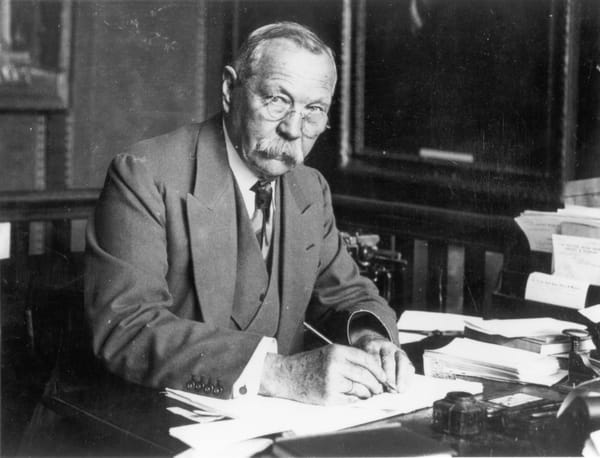Note 59: The return of the Ninth and Tenth Amendments
What judges giveth, judges may taketh away.

The powers not delegated to the United States by the Constitution, nor prohibited by it to the States, are reserved to the States respectively, or to the people.
- Amendment 10, United States Constitution
Apologies for the long hiatus. I’m not ready to get back into a weekly posting tempo quite yet, but I had some Thoughts to share, and this seemed like the best place.
Yesterday’s news that the Supreme Court of the United States struck down the Roe v. Wade decision in Dobbs v. Jackson Women's Health Organization was a bit of a surprise to me, not because recent Republican-appointed justices voted to overturn the decision (nothing they say in a Senate appearance is meaningfully binding - Collins and Manchin hardest hit), but rather because I thought Chief Justice John Roberts - ever the defender of the Court’s legitimacy and reputation - had enough levers at his disposal to reign in the conservative wing of the Court to produce a ruling that would shift things to the Right slightly without causing a big enough disruption that would blow back on the Court.
Boy, was I mistaken!
Today is Day One in the Post-Roe Era and folks are still getting their feet under themselves. Where I live in Illinois, nothing meaningful will change on the abortion front, other than Illinois (and Minnesota) seemed poised to receive an ongoing influx of abortion tourists, seeking to terminate their pregnancies here where the procedure remains legal. Around our Midwestern neighbors, women are adjusting to the seismic shift in what options they have when confronted with an unplanned pregnancy. I suspect that this is the largest policy shift I’ll be seeing in my lifetime (second place are the changes post-9/11), and I suspect that while I have some idea of what will happen, my Day One Post-Roe predictions will play out the same way my Day One COVID Pandemic predictions played out - the things that I think are important won’t be and I’ll be ambushed with developments I couldn’t have imagined.
Nonetheless, I have some Day One Suggestions about things people should think about in the months and years ahead. However, before I get into that, I should put my cards on the table on the issue at hand, so my pre-existing position on the issue of abortion can be “priced in” to the suggestions below.
As a middle-aged man who has been in a stable marriage most of my adult life, abortion is not and has not ever been a Tier One Issue for me when it comes to my political choices and disposition. I hold stronger opinions on how the Roe Era was enacted and the second-order effects that caused than any strong position on the issue itself. (I think it was a useful issue to have for culture warriors, and it took away attention from other issues unfairly.) I’m strongly pro-contraceptive and see no moral issue with products like “day after pills” that terminate a pregnancy shortly after it’s begun. On the flip side, I do see moral issues with waiting until the moment of birth before child can enjoy the protection of the State. I believe that someone injuring a pregnant woman a week before birth is committing just as heinous of a crime as someone injuring a new mother and her child a week after birth. If pushed to choose a “line” where terminating a pregnancy voluntarily crosses from acceptable to problematic (for me), I’d probably draw the line where the unborn child has a sufficiently-developed nervous system where it can feel pain as a complete living being. I have no problems with moving that line in cases of rape and incest, where the woman had limited agency in preventing the circumstances that led to her pregnancy. I support full exceptions in the case where the mother’s physical health may be in serious risk, or the fetus exhibits severe birth defects where the child won’t survive after birth, but I also don’t support abortions in cases where the child may have a genetic issue such as Down’s Syndrome and can be supported and raised into adulthood. (CNN’s S.E. Cupp has a solid Twitter thread that reflects where I’m at on this.) Knowing families that have members with Down’s Syndrome and having had friends with that condition, I know that it’s no cakewalk for the family dealing with it - I’m 100% in favor of the State stepping in to support these families financially and in whatever other ways they may need assistance.
Ardent Pro-Choice and Pro-Life supporters will both find plenty in the previous paragraph to critique. How do we know when a fetus experiences pain, and why do you not apply that standard to your diet? You eat plenty of things that can and do experience pain. Why should a pregnancy that began with rape or incest enjoy fewer protections than one that was planned? The potential child did not initiate the sexual assault. I could fill an entire post with the objections and issues in my position, which is why my squishy abortion stance has not been something that I’ve pushed on others or used my votes to choose one candidate over another - I’m whatever the opposite of a Single Issue Voter is on this issue. I’m fortunate to be in a position in life where this is an issue that has minimal effect on my life. I also recognize that there are others for whom the overnight evaporation of their ability to terminate their pregnancies is of immediate major concern, which brings me to the topic of this Note.
During the Trump years, I pleaded with Progressives and other members of the Left to revisit the ideas of Subsidiarity and Federalism to build up defenses of their preferred policies by employing their local State’s general police powers under the Tenth Amendment to protect the laws that they made for themselves against a hostile Washington DC that did not share the values that resulted in those laws. The clearest example of this coming to a head was when the Trump administration - itself torching decades of Republican credibility on Federalism and local control - went after California’s clean air standards in the political food fight over climate change. I thought that this would be a clear example of where States could be valuable, but that seems to have been a message that was lost after voters booted Trump out of office.
To be fair to my Progressive friends, it’s entirely possible that they saw what was happening in California and were outraged, but couldn’t meaningfully reconcile the idea of approaching issues on a piecemeal per-State basis instead of fighting for “justice for all” at the Federal level. When discussing the potential of the issue of abortion returning to the States, the first objection I always heard was why women in states like Alabama and Texas should be abandoned by Illinois and New York women who do enjoy robust rights to abortion services? That is a laudable position to take, but it may be one where meaningful action is never undertaken when the Perfect becomes the enemy of the Good. From a recent Politico article:
The Democratic Party’s internal divisions usually are cast as disputes between centrists and the left. The intense focus on this dynamic, however, tends to obscure a growing and possibly more consequential argument within progressive ranks.
The fight is becoming bitter. On one side are people who believe in what can be thought of as a unified field theory of political and social change. Diverse issues, from climate change to abortion rights to racial equity, are seen as intimately interwoven, and progress on one priority will only be achieved with simultaneous progress on other fronts. On the other side are people who don’t much buy this theory — and roll their eyes impatiently at theoretical arguments of any sort if they stand in the way of practical results on the specific issues they care most urgently about.
One way to think of the contest roiling the progressive movement is between “lumpers” and “splitters.” The lumpers see American society in need of a sustained and comprehensive overhaul, and are wary of people, even potential allies, who don’t share this synoptic worldview. A core assumption is a commitment to “intersectionality” — the concept that contemporary power arrangements reflect historic and overlapping patterns of discrimination on grounds of race, class and gender and that progress on specific issues must include challenging the underlying power structure.
The splitters prefer to take one issue at a time, and are happy to accept an ally on, say, climate change or gun control, even if that person doesn’t share their views on abortion rights or how to remedy systemic police violence against Black people. In their view the choice isn’t sweeping progress versus incremental gains. It is incremental gains versus no progress at all.
The push to centralize standards and what is allowed at the Federal level is clearly an example of the Lumper approach, while fighting and winning and losing on a per-State basis is clearly the Splitter approach. The Lumper approach is an all-or-nothing tactic where success (and failure) is achieved everywhere at once, and everyone ends up in the same boat, whereas the Splitter approach results in success and failure being distributed unevenly, and you end up with residents in one State enjoying more latitude, choices, and rights than residents in the neighboring State.
As of yesterday, the Lumper approach that the Left has historically relied upon - trust that an enlightened judiciary will step in and protect people when Presidents and Congress will not - is dead. At least two generations of Americans have lived their entire lives where the presence of a (somewhat) Progressive (and at times activist) judiciary was taken as a given. The zenith of the Lumper Era was achieved in 2015 when Justice Kennedy’s Obergefell opinion took the question of same-sex marriages out of the hands of the State, in a manner not dissimilar to how Justice Blackmun’s Roe opinion pulled the abortion issue out of the hands of local legislatures. Almost seven years to the day later, Roe is gone, and many States have already rewound their local abortion laws half a century. And aside from Justice Alito (the biggest fan of witch-hunting jurisprudence in the federal judiciary), everyone else recognizes that the death of Roe is a harbinger for similar cases, such as Griswold v. Connecticut (right to use contraceptives), Lawrence v. Texas (what constitutes permissible private sexual activity), Obergefell v. Hodges (same-sex marriages), and just about every other case decided using the principle of substantive due process to find Constitutional justifications for a decision when the Constitutional text itself was silent. As a Constitutional matter, Roe was not a particularly innovative case that introduced anything new in terms of Constitutional interpretation - instead it leaned heavily on Griswold’s “penumbras, formed by emanations” that the Court used to establish a right to use contraceptives as part of a larger nebulous right to “privacy”. Roe wasn’t struck down because it alone was weak - it was struck down because the foundations on which it was stood was weak. And there are a lot of cases built on that same foundation that folks like Justice Thomas will be gunning for.
The shock that SCOTUS actually carried through with ending Roe is still fresh enough that I haven’t read anything about how Pro-Choice folks will react (politically) to the decision. I expect court packing to resume being a hot topic shortly, as well as proposals for reforming the court, such as term limits. I also won’t be surprised to see folks agitating to impeach one or more of the sitting Justices. (Clarence Thomas being the most likely candidate, given his lack of recusal in a Trump election case and his wife’s activism on that front.) If Progressives focus on “fixing” the Court (Lumping) to the exclusion of other approaches (Splitting), they will only end up wasting a lot of effort and time, and will only set themselves up for another sudden shift like yesterday’s down the road, even if they are successful.
I opened this Note with the Tenth Amendment of the Constitution that empowers States to do be responsible for all the pieces of government that the Constitution did not enumerate. Let me also remind us all of the Ninth Amendment:
The enumeration in the Constitution, of certain rights, shall not be construed to deny or disparage others retained by the people.
Just as the Constitution does not (and cannot) enumerate all of the laws necessary for a functional government, the Ninth Amendment reminds us that just because a right isn’t mentioned in the Constitution, that does not mean that a right does not exist. All it means is that the right isn’t Constitutionally protected, which means that the people themselves are responsible for enshrining those rights in laws, regulations, and amendments. If you believe that there should be a right to abortion, your task now is to work within the context of your local State government to enact one in law. Pro-Choice Red Staters have an steep journey ahead to drum up support for the proposed legislation and convince their fellows (be they Alabamans, Texans, or South Dakotans) that their state would be better off with an abortion right than not. Pro-Choice Blue Staters seeking to assist their neighbors’ change have the task of demonstrating their state is better off by various metrics for having the right. I’ve been shouting for years that American needs to get back to being fifty little “laboratories of democracy”, and yesterday SCOTUS made that happen all at once.
I’d encourage Progressives and other Lumpers to take a look at Federalism again, and instead of seeing it as a codeword for all the injustices historically visited on people in the name of “states’ rights”, look at it as a bulwark that you can raise around your local state to protect your rights in a manner that frees you up to help protect others’ rights as well. This was a lesson that many ignored from the Trump years, and I hope Friday was a wake-up call that the era of judges taking care of everyone is over.
I’m set to work the primary election this next week, and while I expect Illinois to stay Blue this cycle, structural factors combined with an economy struggling to get back on stable footing post-COVID (and in the middle of a major European war) is paving the way for Republican House and Senate majorities that are itching for a good culture war fight leading into 2024 and who will introduce national bills banning abortion across America. These will likely go nowhere during the remainder of the Biden presidency, but it’s not entirely clear that an 82-year old Biden himself will be up for a second term, and the Democrats’ farm system looks a lot like the Chicago Cubs’ farm system toward the end of the Theo Epstein era (i.e not good). And like the 2016 Cubs who failed to make it back to a second World Series, doubling down on Biden is a risky proposition at best (check the actuarial tables), and I don’t expect a President Ron de Santis to serve as a check on a federal legislature hell-bent on outlawing abortion nationally.
So, as a chronic Splitter, I plead with Progressives to recognize that a strong Federalist stance where States assert their supremacy over issues such as abortion is their best bet for retaining those rights anywhere in the nation. Leverage the same system that was blamed a number of past injustices to preserve justice moving forward. Take the conclusion of the Dobbs decision that this is an issue reserved to the States and run with it and defend it zealously. If you’re in a Blue State, make it the kind of State that demonstrates the superiority of your policies. People and companies are already adjusting geographically, and if culture warriors want to drive their States into ditches by repelling enterprises and industries that value abortion rights, there’s precious little you can do to stop them. Work to create opportunities for those who wish to escape.
And moving forward - for the love of all that’s good - let’s relearn how to push for laws that protect the rights we hold dear that can be written down and enjoy higher hurdles to be undone than a Court changing its mind on a Friday morning. Let’s get back to an era where our rights are protected on the page, and not in the hearts and minds of a constantly changing judiciary. Instead of expecting judges to protect us with floppy tools like substantive due process, let’s shift our expectations back to where judges serve as the referees interpreting the law that already exists on paper. I know that this is very Schoolhouse Rock of me to suggest, but the chaos and disruption introduced yesterday illustrates the capriciousness, unpredictability, and failure of the status quo that we enjoyed on Thursday.
In my own life, there’s a lot of change and uncertainty underway, which has been the primary cause of my lack of Notes over the past months. In a nutshell, earlier this year, I realized that the business I’ve been running for the past five years isn’t one that’s compatible with my own sanity moving forward, and I’m in the process of building a menu of options for next steps. I may end up folding my operation up within a larger organization, keeping the consulting business and pivoting to a different sector, or something else entirely. I’ve had enough on my own plate to keep me from coming up with decent topics for Notes.
I’m looking to get back to regular Notes in the future, but that’s still an indeterminate amount of time away, as I try to reestablish some stability of my own to my daily life.



